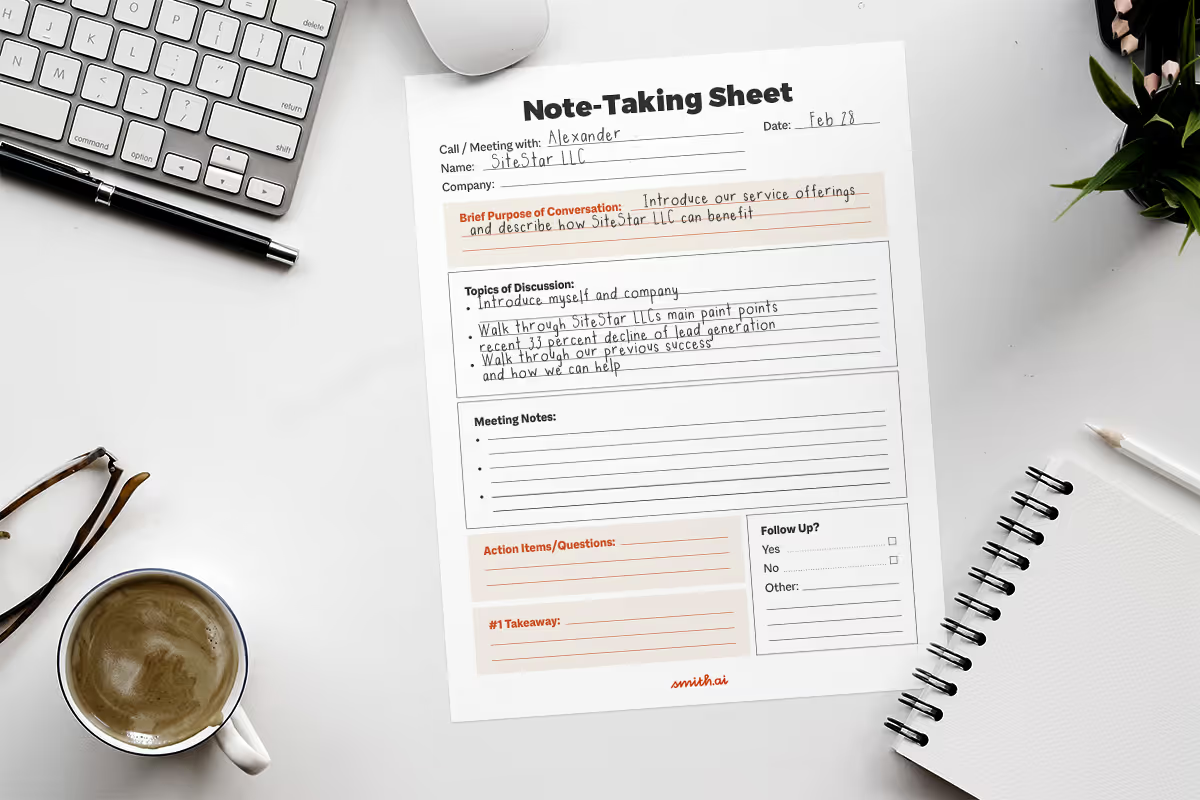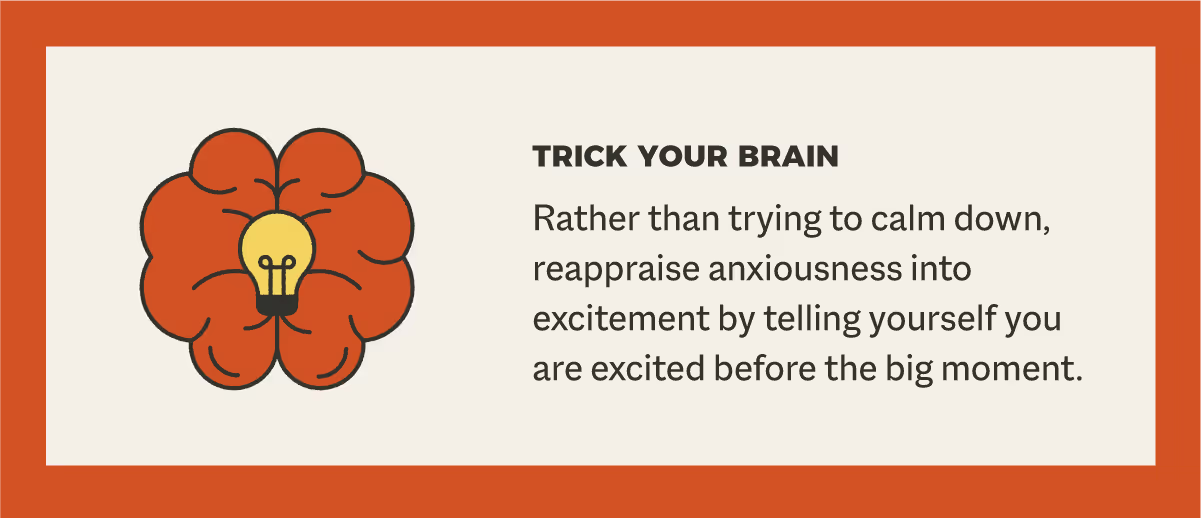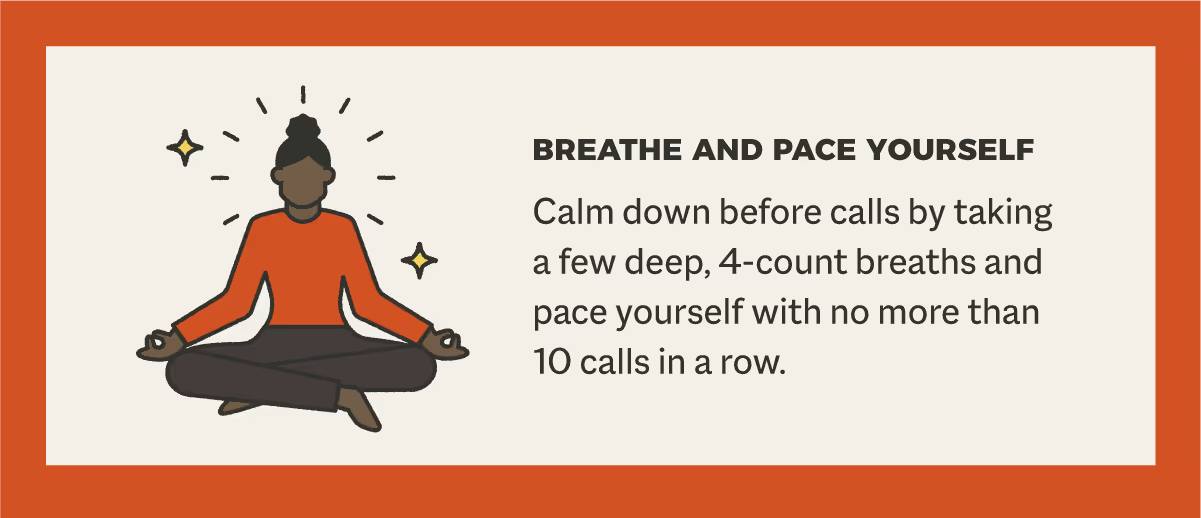Telephobia: 7 Tips to Help You Overcome Phone Anxiety
Telephobia: 7 Tips to Help You Overcome Phone Anxiety

Have you ever gone out of your way to avoid receiving a phone call? In business, there’s no getting around it. For some, a rewarding client or sales call is something to look forward to, but for others a call may be very anxiety-inducing. If the latter feels familiar, you may suffer from a condition called telephobia.
If you dread phone calls, know you aren’t alone! Many people dislike making or receiving phone calls, but if you experience symptoms of serious anxiety, telephobia can impact you in both your personal and professional life.
In fact, telephobia affects up to 76% of millennials and 40% of baby boomers, therefore it’s something to take seriously.
Whether you yourself struggle with telephobia or you are a business leader looking for ways to help your team develop their phone skills, read on to find out the potential causes of telephobia, its impact on business performance, tips to help you overcome it, and outsourced receptionist options that will help take the burden off your plate.
What is telephobia?
Telephobia is the reluctance or fear of making or taking phone calls. It has many names, including telephone phobia, telephonophobia, phone phobia, and most commonly phone anxiety.
Telephobia is commonly compared to glossophobia (stage fright), as they both arise from having to engage with an audience. This is usually associated with the fear of being criticized, judged, or rejected and can fall under the umbrella of social anxiety, which affects 15 million adults in the U.S.
Sometimes the sound of your voice or choice of words can make you feel self-conscious. Talking on the phone can also be daunting because there’s no way to observe social cues such as facial expressions and body language.
What causes phone anxiety?
There are many factors that can cause people to have phone anxiety. Whether it stems from a social anxiety disorder or is just a part of an introverted personality, telephobia affects many people.
.avif)
Performance Anxiety
The most common cause of telephobia is performance anxiety. Performance anxiety is when a person dreads situations where they have to essentially perform in front of people, whether it’s giving a speech, meeting with clients, business networking, or having a sales call.
This type of anxiety is one of the most common, as it affects up to 20% of Americans. People who dread or avoid phone calls due to performance anxiety do so because of their fears of a negative evaluation, being judged, or ultimately being rejected by others.
Depression
Another cause of people avoiding the phone is depression. Depression is a serious condition that causes symptoms like extreme sadness, fatigue, guilt, and social withdrawal.
Since the pandemic, research from Boston University found that depression rates rose to a staggering 32.8% in 2021. While in a major depressive episode, people tend to withdraw from communication, including over the phone.
An Extremely Introverted Personality
Sometimes, an avoidance of the phone has a much simpler explanation, like being extremely introverted. Introverts make up an estimated 25%-40% of the population and tend to focus more on internal thoughts, feelings, and moods rather than seeking out external stimulation.
With the rise of digital communication, the use of telephone calls has become less common as texting and email have taken over. Many introverted people prefer this type of communication because it's less intrusive than a call and it allows them to avoid social formalities such as small talk — which may be draining for extreme introverts.
Digital communication also allows introverts to better manage their conversations so that they can have time to reflect before giving a response. This can bring a sense of comfort, while being put on the spot on a phone call can be anxiety-inducing.
Posttraumatic Stress Disorder (PTSD)
Posttraumatic stress disorder (PTSD) is a mental condition that affects 3.5% of the U.S. population. It occurs after an individual has experienced any kind of traumatic event and can be triggered by factors that serve as reminders of the sufferer's experience.
For example, those who may have experienced a traumatic event such as receiving bad news over the phone could develop PTSD and telephobia. Telephone calls may trigger their PTSD, which will lead them to shut down or avoid talking over the phone altogether.
The impacts of telephobia on a business
Many times, a phone call is the first impression a client, customer, or prospect will get of a business. Whether you’re a new startup or an established enterprise, giving a great impression is of utmost importance, as it establishes a high-quality professional image and helps build strong relationships.
With phone calls playing an important role in the customer experience and calls still being one of the highest methods of conversions, it’s important for business leaders to take note of the impact phone anxiety may have on their employees and customers.
.avif)
Phone anxiety can impact the customer experience
Today’s customers have high expectations for brands, demanding a positive experience throughout the entire customer journey. One of the most important factors of the customer experience is phone calls, as 65% of customers want to reach out to brands by phone.
Moreover, 80% of Americans believe the most valued elements of a positive customer experience are speed, convenience, knowledgeable help, and friendly service.
If employees suffer from phone anxiety, it may affect their responsiveness and ability to connect effectively with customers, resulting in poorer customer retention rates.
Telephobia influences workplace performance
In the business world, there’s no avoiding telephone communication. Whether a business has adopted the virtual workplace or are true believers in traditional communication methods like the telephone, those with phone anxiety can struggle in the workplace.
Telephobia can cause a lot of anxiety in employees which can affect their work. In fact, a study done by the Anxiety & Depression Association of America found that anxiety impacts the workplace performance of 56% of workers.
Ultimately, the fear of talking on the phone can have adverse results for performance, productivity, or even job mobility.
Phone anxiety can affect conversion rates
Although technologies that enable communication without directly speaking to someone (think: chatbots) have become increasingly popular in recent years, the humble telephone call has remained tried and true.
Phone calls are often the most valuable marketing conversions, as 84% of marketers report phone calls having higher conversion rates compared to other forms of engagement.
Those with telephobia may have to face their fears of telephone communication in order to increase sales, generate leads, and keep business running efficiently.
7 tips to help you overcome phone anxiety
Whether you yourself struggle with telephobia or you are a devoted business leader looking for ways to help your team hone their phone skills, try these expert tips to help overcome phone anxiety and improve overall job performance.
1. Cognitive behavioral therapy
Cognitive behavioral therapy (CBT) is a form of psychological treatment that has been demonstrated to be effective for a range of problems including anxiety disorders like telephobia. CBT treatment usually involves identifying and understanding unhelpful or irrational thoughts and practicing systematic desensitization.
With the help of a therapist, those who suffer from severe phone anxiety can work through identifying where their fears stem from and how they can change those thinking patterns to be more realistic and effective. Some strategies include re-evaluation of one’s distortions in the light of reality, using problem-solving skills to cope with difficult situations, and developing a greater sense of confidence in one’s own abilities.
Additionally, practicing systematic desensitization allows exposure to anxiety-provoking situations, like hearing the phone ring or sustaining a phone conversation, all under the watchful eye of a trained psychologist. This graded exposure is believed to desensitize an individual from feeling fearful of a stimulus and ultimately stop fearing the stimulus altogether.
2. Exposure and practice
Sometimes the nervousness you feel before talking on the phone isn't as deep-rooted as a severe anxiety disorder. In the modern age where text messaging has become more common than the standard phone call, you may just be out of practice!
.avif)
In this case, giving yourself extra exposure to talking on the phone can help you gain the confidence you need to sustain an effective phone conversation. Depending on how severe your phone anxiety is, there are many hierarchy tactics used in CBT that you can do at home.
If you find strangers more difficult to talk to, start calling people you are more familiar with by using this hierarchy example to help your confidence with personal communication:
- Calling a close friend or family member to ask a simple question
- Calling a trusted colleague about a work-related issue
- Calling a friend or family member to discuss your day
- Calling an old friend to catch up
Note: Your hierarchy may vary depending on who you feel more comfortable talking to on the phone and what you are discussing.
Sometimes, talking to someone that you know can be more difficult. The anonymity that comes from talking to strangers can bring some comfort and may be a better starting point. In that case, use this hierarchy example to help you ease into conversations with those you don’t know:
- Calling a customer service line with a recorded message
- Calling a business and asking a straightforward question, like when they close
- Calling a local restaurant to order food (bonus if you ask about their specials!)
- Calling to book a reservation at a hotel or restaurant
These are all great places to start to feel more confident with talking on the phone, but make sure you challenge yourself once these basic conversations feel comfortable and natural.
3. Prepare talking points
Just like practice makes perfect, so does preparation. When you get nervous for a phone call, it’s fair to say you may get a little jumbled and forget a few key points of your pitch or consultation. It’s important to do some preparation before making a call, but don’t go overboard.
While writing out a full phone call script is helpful in some situations, it takes the human element out of a conversation and limits personal connection and engagement. Speaking spontaneously, with authentic conviction and awareness, signals that you have something to say and makes the conversation flow naturally.
Know generally what you are going to say, but try to anticipate that the conversation may not go exactly as you have planned. If there are important points that you need to bring up, make sure to write those down and keep them handy for easy referencing.
Writing down notes before, during, and after your phone calls could be of great value to you or potential clients. You could gain insights such as pieces of feedback for your customer support team who aren't meeting expectations, a product issue or technical bug that needs fixing, a new business venture or opportunity, or even a partnership that has ROI potential.
Try using this printable note sheet that will help keep your topics of discussion in order, making the conversations more efficient, focused, and meaningful.


4. Trick your brain into thinking you’re excited
If you suffer from performance anxiety, the feeling you get before making or receiving an important phone call can feel like an adrenaline rush. When you feel your heart begin to race or those pre-call jitters, it’s common to tell yourself to just “calm down.” Have you noticed that it doesn't really help at all?
A better and proven strategy to help you fight your phone anxiety is to trick your brain into thinking it’s excited. Feeling calm is a low-arousal state of mind while feeling nervous or anxious is associated with high arousal. The feeling of excitement is also associated with high arousal, so it’s easier to tell yourself you are excited rather than calm.

In a study conducted by the American Physiological Association, individuals who reappraised their anxiousness as excitement felt more excited and performed better compared to those who tried to calm down. To trick their brains into feeling excited, all they had to do was use minimal strategies such as saying, “I am excited” out loud or write messages to themselves like “Get excited” before the big moment.
By using these simple strategies you can repurpose anxiousness into excitement, adopt an opportunity mindset, and improve your overall phone call performance.
5. Put a smile on your face
When you have phone anxiety, you may experience a shaky voice, shortness of breath, or even stumbling over your own words. When these things happen it can make you sound apprehensive and make you feel even more nervous than before. This comes across to the caller or call recipient, and it can make them feel nervous, too — not a good starting point for a productive call.
Since your tone of voice is essential for making a good impression, try smiling before making and receiving calls. This may sound silly, but research has shown that people can actually “hear” your smile. This will help you convey a sense of pleasantness to the person you're speaking with and give them the impression that you are confident with what you are pitching — which is especially important for sales calls. If you’re more at ease, your sales prospect on the phone will be more at ease, too.
Not only does smiling help you sound more confident, but there’s evidence that it also makes you feel happier. When you feel happier, you begin to relax and focus better on the task at hand.
6. Breathe and pace yourself
Prioritizing your mental health is essential for coping with telephobia and the symptoms you may experience. With that being said, remember to breathe and pace yourself as you perform a call. Calm down before calls by taking a few deep, 4-count breaths and pace yourself with no more than 10 calls in a row.

You could also try these mindfulness activities before and after a phone call such as:
- Deep breathing exercises: While preparing for a call, practice deep breathing exercises such as box breathing, which has been proven to reduce stress and improve focus.
- Meditation: Try a guided or self-meditation session 15-30 minutes before a call to help ground yourself and be in the present moment.
- Visualizing success: Before a call, imagine a positive conversation and all the things that could go right rather than what could possibly go wrong.
- Avoid overthinking: If you get turned down, realize that it could be for many reasons that have nothing to do with you, and try not to read too much into someone else's actions.
- Rewarding yourself: After a phone call, reward yourself with a small break to do something you enjoy.
By incorporating these techniques into your routine, it can help reduce your anxiety and improve your overall work performance. Once it’s all said and done, try to remember the relief you feel after a positive phone call and keep that in mind before the next one.
7. Use non-vocal communication methods
While phone conversations work best for more complex exchanges, they may not always be the best method of communication, especially if you have phone anxiety. Other communication methods such as email, text, or web chat allow you to remain in your comfort zone while giving you extra time to reflect before responding.
For those with severe telephobia, using these other methods of communication may even help you perform better so you won’t have anxiety getting in the way of your success.
If phone calls are the only option, consider hiring a virtual receptionist to take on answering your calls so you can focus on other aspects of your business that your skills are better suited for.
.avif)
Try Smith.ai virtual receptionists
Whether you are a solo entrepreneur, growing team, or mature business organization, communication across all channels is important to gain new sales leads and scale efficiency. However, telephobia can get in the way of that for you and impact your business.
To help, Smith.ai offers features to cover all channels of communication like virtual receptionists, outreach campaigns, and website chat solutions so we can focus on your inbound and outbound communication while you can stay focused on other aspects of your business. Book a free consultation to see how our professional, 24/7 staff can help.
Sources: Face For Business | ADAA 1, 2, 3 | The Atlantic 1, 2 | Boston University | VeryWellMind | Odyssey | Invoca 1, 2 | PwC | APA 1, 2 | Harvard Business Review | ScienceDaily | Scientific American | WebMD
Take the faster path to growth. Get Smith.ai today.
Key Areas to Explore

Your submission has been received!














.svg)



